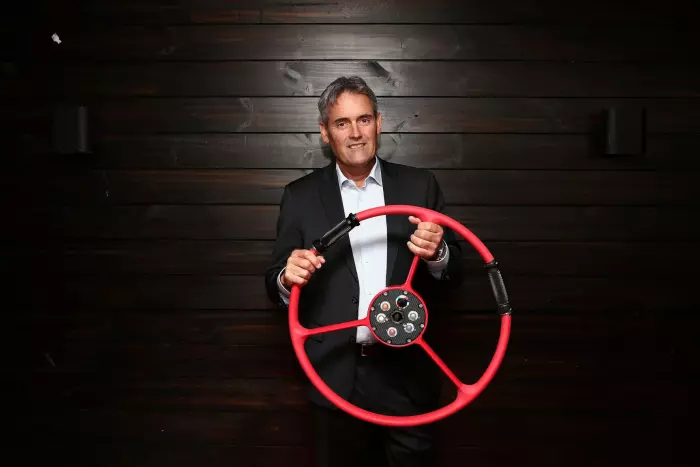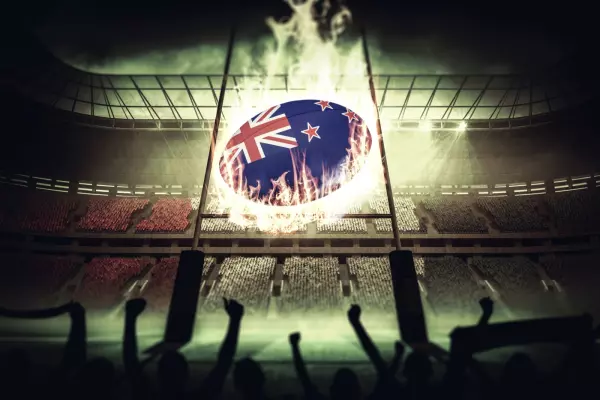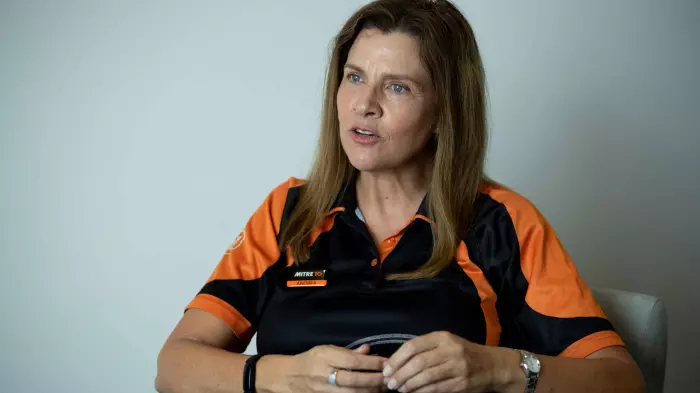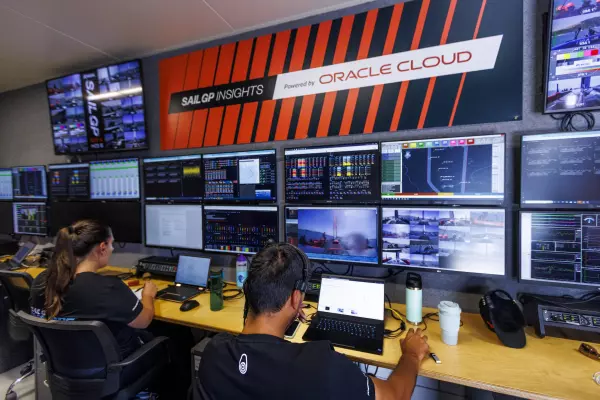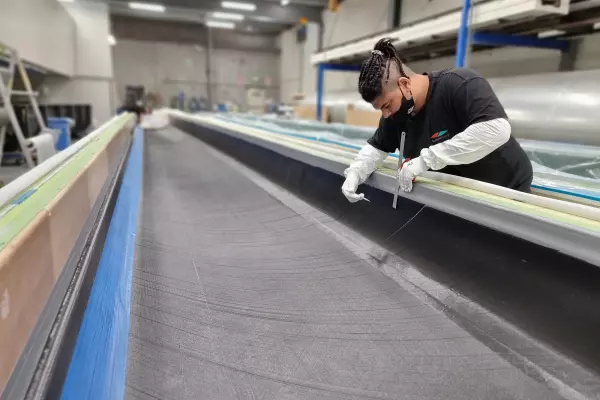Imagine a world where professional sports teams are owned and operated by passionate fans with skin in the game rather than rich and secretive individuals and faceless boards. A world where a fan can personally influence their team’s story and culture and feel genuinely empowered as a result.
Welcome to the fan-driven future Sir Russell Coutts is sailing towards along with his close tech buddy and Oracle benefactor, the American billionaire Larry Ellison.
Coutts and Ellison created their SailGP series after becoming disenchanted with the America’s Cup following Team New Zealand’s Bermuda triumph in 2017. Their latest move is as innovative and cutting edge as the foiling catamarans deployed in the burgeoning franchise-based league.
Coutts has announced SailGP intends to sell a team to a decentralised autonomous organisation (DAO) that will operate the franchise via blockchain technology including using NFTs (non-fungible tokens).
OK, I know your eyes just glazed over, so let’s just decipher that for a moment and bring the language back to something we simple sports fans can understand….
Russell and Larry are going to let a team sail in their series which will be selected by fans who will also control all decision-making including the appointment of and the tactics of the skipper and crew.
Yes, you read that right. The new fan-powered franchise will be sailing right up alongside the likes of Kiwi icons Peter Burling and Blair Tuke and Great Britain’s Sir Ben Ainslie.
If you care enough about sailing (and that might be the hardest challenge for Coutts … finding enough fans who do care and can afford some skin in the game), you can be part of the decision-making team which put them there and influences their next move.
The innovation adds an element of intrigue to a series Coutts has described as “Formula 1 on the water”. But it is much more than a novelty play.
Coutts is boldly sailing into waters very few are yet to navigate but provides us a glimpse of what sport could be like in the future where a metaverse has become reality instead of a Mark Zuckerberg-appropriated cliché.
A “decentralised autonomous organisation” (aka, a DAO) is powered by a “smart contract” that is highly transparent and allows collectives to drive decision-making instead of an individual or a centralised body such as a board of directors. Rules, and all decisions made, are recorded as they happen and verified with blockchain technology.
Giving power to the fans
Details of SailGP’s DAO initiative leaked out at the recent United States round of this year’s series which features eight teams, including NZ, with plans to add two more next year and the “fans’ boat” the year after that.
Coutts says he wants to give more power to the fans as well as create a unique selling point for his series.
“(With traditional sports ownership) a very small number of people get to make the decisions for a team. There’s a bunch of fans underneath them that support the team – but have no input or control,” he said in San Francisco.
“People are emotional about sports so imagine if you flip the model – so fans actually have a say in what the team is. It’s about empowering a community of fans to really become engaged.”
In theory, that means the owners of the new franchise could determine which nation the team should represent, who the skipper is and even, as one observer noted, appoint an all-female crew if they want to.
To make the initiative work, SailGP has entered into a technological partnership with sustainable blockchain firm Near. Other Web 3.0 innovations including non-fungible tokens (NFTs) are on the agenda.
SailGP was born out of Coutts’ frustrations with the America’s Cup and he prides himself on being agile and not hidebound by tradition and moribund legal tape.
“Ultimately we’re able to make changes because we’re a new property and not locked into processes like other organisations that have been operating for more than 50 years and have a group of owners in place that may not want to give up their rights,” he explained.
There’s a lot more detail required but ultimately the new franchise’s owners will have total control over all elements of the syndicate including commercial decisions, strategy and operations.
Coutts is not the only person dabbling in these waters.
 Coutts has described SailGP as F1 on the water (Image: Getty)
Coutts has described SailGP as F1 on the water (Image: Getty)Fan-controlled sport: a new frontier
“Fan-controlled” sport is seen by many as a breakthrough innovation and there are ventures in both the US and the UK, mixing both the old and the new.
In England, a recent high profile example was the purchase of English fourth division club Crawley Town by a group called WAGMI United which stands for “We’re All Gonna Make It”.
The group says its brand is at the “intersection of crypto and sports” and plans to involve “the global Web3 community” by bringing a “digital-first, community-empowered approach” to running the club.
Crawley Town has operated for more than 125 years under a conventional ownership model that is no longer working for the struggling club who are stuck halfway down the points table in fourth-tier English soccer and haemorrhaging hundreds of thousands of pounds.
“We think the club can do better and our fans deserve better,” said WAGMI United founder Preston Johnson in a press release. “Sports are supposed to be fun and bring communities together. At Crawley Town, we’re going to shake up the status quo, try out some new ideas, and build a worldwide community of fans new and old that can be excited to cheer on the Red Devils together – stretching from West Sussex to anywhere in the world with an internet connection.”
Coutts and WAGMI United have a similar goal – utilise the power of Web3 protocols to break down geographic boundaries and attract a rush of new supporters.
In the case of Crawley Town, which currently averages 2,000 people per home game and has bugger all sponsors, the theory is that new international supporters will create new revenue streams and significantly improve the club’s financial clout.
It’s a fascinating premise. Could Crawley Town significantly improve their on-field performance under this model and ultimately climb to Premier League status? If you’re a Crawley Town supporter, it’s probably worth a shot because you’re not going to get there any other way. And you might find there are other football fans elsewhere in the world willing to join you on the journey.
“WAGMI United believes this community-powered approach will also open doors to exciting new partnership opportunities and unlock valuable new revenue streams that will allow us to expand Crawley Town’s budget far beyond levels typically seen by an English football league club of this size,” said Johnson.
“With more financial resources than our competitors to bring in the best possible players and coaches and ensure they have access to the most advanced analytics available, these investments should translate into what matters most … wins.”
Bold new American league
In the US, “Fan Controlled Football” is a closely-observed experiment similar to the SailGP and Crawley Town ventures.
FCF is a professional indoor “Physical-meets-Digital League” variant of American football. It’s now in its second season and features eight teams all with celebrity owners. Fans buy NFTs to help govern teams and influence plays.
Matches stream live on Amazon’s Twitch and other platforms. The league convinced 48-year-old NFL Hall of Famer Terrell Owens to play in the American football derivative. Owens is trying to convince civil rights activist and former football quarterback Colin Kaepernick to join him.
FCF recently announced it was adding four teams based on prominent NFT collections and creators including the Bored Ape Yacht Club. Its pairing of real-life competition and digital governance is what Coutts is aiming at.
In SailGP’s case, a DAO franchise offers an alternative entry route to the series as well as a mixture of the old and the new which is where the real sporting Metaverse is likely to end up (a global playground of digital connection but offering utility value within the physical world).
Coutts is backing his intuition that sports are one of the most powerful community-based assets available and new digital protocols are going to introduce fan experiences to anyone with an internet connection.


